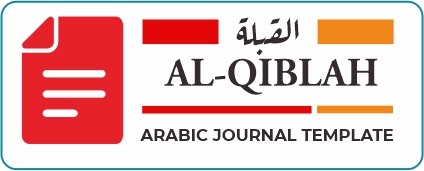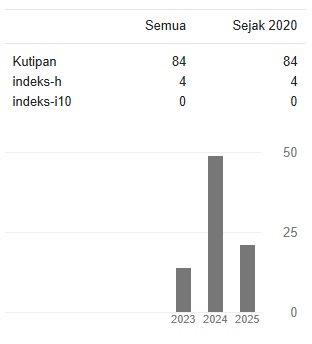Aliran Barnāsiyah dalam Kesusatraan Arab: Kajian Historis
Parnassianism in Arabic Literature: Historical Studies
DOI:
https://doi.org/10.36701/qiblah.v3i3.1401Keywords:
Parnassianism, Literature, HistoricalAbstract
This study aims to investigate and reveal the role of Parnassianism in the development of Arabic literature. Parnassianism, which originated in France in the 19th century, emphasized formal beauty, clarity, and technical rigor in literary works, while rejecting the excessive use of emotional expression. This research shows how the influence of Parnassianism has permeated the works of prominent Arabic literati, influencing writing style, poetry structure, and themes raised. Through historical approaches and comparative literary analysis, this study traces the presence of Parnassianism in the works of Arab literati, from the introduction of Parnassian aesthetic concepts to their application in the context of Arabic literature. The works of Arabic literati such as Aḥmad Syawqῑ, Ḥāfiẓ Ibrāhῑm, and others are explored to highlight the formal use of Parnassianism and how it influenced the evolution of modern poetry in the context of Buddhism.
Downloads
References
Mandūr, Muḥammad. Al-Adabu wa mażāhibihi. Miṣri: Liṭṭabā’ati wa An-nasyari wa At-tawzῑ’i, n.d.
Maryam, Sitti. “Historisitas Aliran Neo-Klasik Dalam Kesusastraan Arab.” Al-Irfan : Journal of Arabic Literature and Islamic Studies 2, no. 1 (2019): 121–41. https://doi.org/10.36835/al-irfan.v2i1.3388.
Moleong, Lexy. Metode Penelitian Kualitatif. Bandung: Remaja Rosda karya, 2015.
Najib, Emha Aenun. “Karakteristik dan Aplikasi Aliran Romantisme Arab.” Insyirah: Jurnal Ilmu Bahasa Arab dan Studi Islam 4, no. 1 (2021): 41–50. https://doi.org/10.26555/insyirah.v4i1.3988.
Philip Khuri Hitti. History of The Arab (Ter. R. Cecep Lukman Yasin dan Dedi Selamet Riyadi). Jakarta: Serambi Ilmu Semesta, 2005.
Pratama, Rudyyanton Salam, dan Agam Sulaima. “Aliran Sastra Arab Modern; Madrasah Diwan.” Prosiding Fakultas Agama Islam Universitas Muhammadiyah Mataram 2, no. 1 (2023): 43–51.
Qaṣṣāb, Walῑd. Al-Maẓāhib Al-Adabiyah Al-Garbiyyah. As-Syām, 2005.
Rahmap. “Aliran Basrah; Sejarah Lahir, Tokoh Dan Karakteristiknya.” At-Turats 8, no. 1 (2014). https://doi.org/10.24260/at-turats.v8i1.104.
Sari, Hativa. “Aliran Realisme dalam Karya Sastra Arab.” Diwan : Jurnal Bahasa dan Sastra Arab 12, no. 1 (2021): 1–14. http://journal.uin-alauddin.ac.id/index.php/diwan.
Shidiqiyah, Firstiyana Romadlon Ash. “ALIRAN SASTRA ARAB KLASIK SEBAGAI RESPON ATAS MODERNISASI ARAB: KAJIAN HISTORIS” 5 (2022): 111–22.
Sukron Kamil. Teori Krtik Sastra Arab Klasik dan Modern. Jakarta: Raja Grafindo Persada, 2012.
Zagheib), Andre Richard (terjemah dari Henry. An-naqdu Al-Jamālῑ, 1973.



 FOCUS AND SCOPE
FOCUS AND SCOPE EDITORIAL TEAM
EDITORIAL TEAM












